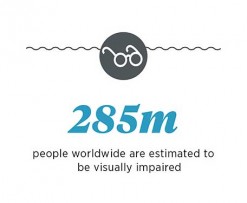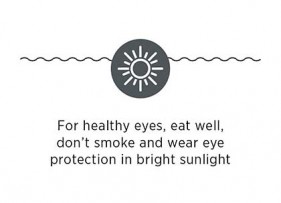Half of all sight loss is avoidable yet forecasters predict that the number of people living with sight loss will double to four million by 2050 and one in six of us will become blind or partially sighted by the age of 65. In addition, a quarter of over-60s say the quality of their vision affects their daily routine.
These figures are shocking and yet one in ten UK adults have never had a sight test and 20 million of us fail to have our eyes checked once every two years, as recommended. The worrying truth is many of us only visit our optometrist when we are aware something is wrong and sadly this can mean the damage is already done.
National Eye Health Week aims to raise awareness of the importance of sight tests and lifestyle choices that affect eye health
Sight tests are essential health checks and do far more than simply checking how well a person can see. Not only can they detect eye conditions, such as glaucoma, before they cause irreversible vision loss, they can also uncover signs of general health problems, including diabetes, hypertension and high cholesterol.
Raising awareness
 National Eye Health Week (September 21-27) aims to raise awareness of the importance of sight tests and lifestyle choices that affect eye health.
National Eye Health Week (September 21-27) aims to raise awareness of the importance of sight tests and lifestyle choices that affect eye health.
Just one in ten smokers is aware that smoking affects eye health, despite the fact they are up to four times more likely to suffer from macular degeneration, the leading cause of blindness in the UK. This compares to 92 per cent associating smoking with lung cancer and 87 per cent identifying a link between smoking and the risk of heart disease.
Sixty per cent of people are unaware that what they eat can affect eye health and yet a poor diet can put sight at risk. There are many foods that are rich in eye-friendly nutrients, such as fish, blueberries, grapes and green leafy vegetables, which have been shown to help prevent and relieve conditions such as macular degeneration and dry eye syndrome.
Too few of us understand the importance of protecting our eyes from the cumulative effects of ultraviolet (UV). Perhaps surprisingly it’s not just in the summer that we should protect our eyes from the sun. The sun’s low trajectory in the spring and autumn months can significantly increase the amount of damaging UV our eyes are exposed to, increasing the risk of suffering conditions such as cataracts.
There are examples of communities all across the country that are at risk of avoidable sight loss, but do not take the opportunities available to them to identify the issue and seek help. In areas like Leicester and Gateshead we are seeing a worrying number of people failing to take up their entitlement to free NHS sight tests, and higher than average levels of smoking and obesity – two lifestyle factors linked to sight loss. Meanwhile Norfolk is a hot spot for prevalence of cataract, glaucoma and macular degeneration.
Importance of eye care
During the next seven days we’ll be seeking to change this by raising awareness of the need to take care of your eyes and make sight tests as much a part of your healthcare regime as having dental check-ups, a blood pressure check or smear test.
 For instance, Newham Council will be hosting a series of events across the East London borough to educate residents about their entitlements to eyecare paid for by the NHS and providing advice on how to adopt a healthier lifestyle to benefit eye health after it was identified as an area at increased risk of avoidable sight loss.
For instance, Newham Council will be hosting a series of events across the East London borough to educate residents about their entitlements to eyecare paid for by the NHS and providing advice on how to adopt a healthier lifestyle to benefit eye health after it was identified as an area at increased risk of avoidable sight loss.
It is never too early to start caring for your eyes. Children should have a sight test before the age of five as poor vision due to a squint or “lazy eye” should be identified as early as possible to enable treatment. It is estimated that one in five school-aged children has an undetected vision problem and so again a regular sight test is essential.
A routine eye check takes just 30 minutes and for millions of us it’s absolutely free – paid for either by the NHS or an employer. In particular, those most at risk, people over 60, will be entitled to a sight test paid for by the NHS. Children and those on low incomes are also eligible, with many benefiting from help towards the cost of spectacles, if required.
While most people, if not all, would agree that sight is the key sense, there still exists a huge gap between this fact and translating the fear of losing sight into action to protect our eyes. We aim to change this and help reduce the number of people who are living with avoidable sight loss.
WHAT’S ON DURING NATIONAL EYE HEALTH WEEK
Here’s a snapshot of some of the events taking place during the week.
To find out what’s happening in your local area visit www.visionmatters.org.uk/whats-going-on
or follow @MyVisionMatters on Twitter
Monday September 21-Friday September 25
Vision Van on tour
Monday September 21, from 12 noon
Schools across Bedfordshire
Eye Heroes Workshops
Series of interactive workshops for children aged 8-12 years
Tuesday September 22, from 9.30am
The Village Opticians, Prestwich Manchester
Number Plate Challenge
Host of eye health information plus a chance to check you vision is roadworthy
Wednesday September 23, 7pm
Devon Local Optical Committee Live Online Broadcast www.hiblio.tv/live
Children’s vision and good eye health
Thursday September 24, 2.30–4pm
The Gate Library, Newham
Eye Health Information Stand
Friday September 25, from 1pm
Porth Plaza, Ports, Wales
Eye Health Information Event
Drop in for a cuppa and a chat with a host of eye health experts
Saturday September 26, from 10am
Harrogate Library, Victoria Avenue, Harrogate
Look After Your Eyes Event
Advice and information on looking after your eyes
Sunday September 27, from 7pm
Melia Whitehouse, London NW1 3UP
Eye Nutritionals Cocktail Evening
Some events need to be pre-booked – check the website for details
For more information about caring for your eyes, including a cook book full of mouthwatering recipes packed with eye-friendly nutrients, advice on smoking cessation, guides to preventing screen fatigue, and wearing and caring for contact lenses, plus a copy of Vista, a lifestyle magazine bursting with eyecare advice, go to www.visionmatters.org.uk or visit your local optometrist
Raising awareness

Importance of eye care

